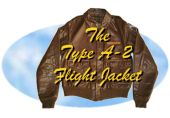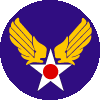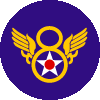Jacket Description and Details, Part 3
|

|
Type A-2 Jackets by Manufacturer, Page 2
Jackets Featured in this Section (listed alphabetically)
On this page:
- Monarch Mfg. Co.
- Perry Sportswear, Inc.
- Poughkeepsie Leather Coat Co. Inc.
- Rough Wear Clothing Co.
- I. Spiewak & Sons
- Star Sportswear Mfg. Co.
- United Sheeplined Clothing Co.
- Werber Sportswear Co.
|
Go to the previous page:
- 42-18246-P (No maker name)
- W535-AC-23383 (No maker name)
- Aero Leather Clothing Co.
- Bronco Mfg. Corp.
- Cable Raincoat Co.
- Cooper Sportswear Mfg. Co.
- David D. Doniger & Co.
- J.A. Dubow Mfg. Co.
|
This section contains photos and descriptive information to illustrate
the style and construction characteristics of original A-2 jackets produced
by the individual makers. Because of variations which can be found
within or across contract runs, some details shown here should not necessarily
be taken as exclusive or consistent. These variations can include such things as
hide type and color, hardware (snaps, zips), knit color, construction techniques,
and workmanship. Nonetheless, most makers had one or more distinguishing
characteristics or combinations thereof to make them generally distinctive.
A concise list of distinguishing features is included with each maker. These
lists are derived from observations and, due to the nature of jacket variations and
to limited historical evidence, some features are provided as guidelines and not
as definitive characteristics.
Monarch Mfg. Co.
Distinguishing Characteristics
- Long collar with rounded points.
- Shoulder seam centered under the epaulet.
- Softly rounded pocket flaps.
- Rotated inset sleeve seam.
- Collar snap backs are not riveted through the lining.
Example Description
The Monarch A-2, contract W535-AC-23378, is distinguished by its long and rounded
collar, by its typographically varied label, and by being the jacket worn by
Chuck Yeager when he became the first person to fly faster than the speed of sound.
This particular example is a light russet brown which has faded over its
life but maintains evidence of its original shade within its pockets and
in a few other lesser exposed places. The hide is buttery soft and exhibits
some deep and distinctive wrinkles in some areas. The zipper, not shown
separately, is a triple-marked Talon. There is no triangular reinforcement
stitching at the bottom of the zipper.
Images:
- Jacket front.
- The label shows much more
typographical flair than most others in the unusually shaped letters of
uniformly thin width on the top lines and the thicker letters in lower case on the bottom
two lines. Oddly, there is a hyphen after "TYPE" and before "A 2", but there
is no hyphen for A-2. This is not unique to this jacket; it is seen on
other Monarch examples. There is a discrepancy in the label in that a
contract number is shown but it is stated to be an order number. Note the
darker shade of the hanger compared to the collar.
- The long collar points and
simple collar attachment are seen here. The AN inspectors stamp under
the label has the inspector number U26 and measures 5/8" in diameter.
- Another view of the collar shows the
ball stud snaps and how the backs of the snaps are not riveted through
the lining.
- The epaulet has rather square
box-stitching which is contained within the inner stitch lines of the strap.
- Under the epaulet is seen the shoulder seam,
which is centered underneath the strap and is top-stitched on one side of the seam.
- The pocket flap is softly rounded
in the corners and at the modestly extended point.
- Evident in this open pocket view
is the darker unfaded shade of russet brown. Not shown here is the snap
reinforcement inside the pocket which is a separate tab of leather and not
the more common folded over extension of the top of the patch.
- Surviving after so many years is this pocket label
of heavy paper sewn at the top of the right pocket on the patch side. Note
the designations for "Sched." and "Size" rather than "Lot" and "Size."
- This side view shows the rotated
seam of the inset sleeve.
- The name plate is a light
natural shade leather.
Perry Sportswear, Inc.
Distinguishing Characteristics
- Collar stand for all contracts.
- Short, rounded collar points.
- Soft and shallow curves to pocket flaps, with stitch lines which are spaced farther
than typical from the edge of the flap.
- Three-piece inner wind flap on some jackets.
- Open box-stitch reinforcment at top corners of pockets.
- Some jackets in goatskin.
Example Description
[Perry A-2 photos supplied by a contributing reader.]
Perry Sportswear, like Rough Wear, continued to use a collar stand construction for all its
A-2 jackets throughout the war, while makers such as Aero and Dubow transitioned to the
simple collar attachment. It is not shown here, but the collar snap backs are riveted through
the lining and covered with lining material. While this particular example, from order
number 42-16175-P, is ostensibly of horsehide, Perry also produced A-2 jackets of goatskin.
Images:
- Jacket front view. Note the short, rounded collar points.
- Jacket back view.
- Label. Note the AN inspector's stamp nearby.
- The epaulet has rectangular box-stitching which is
contained within the twin stitch lines. The collar stand is visible here, as is the shoulder seam
placed behind the epaulet.
- The pocket flap has a soft and subdued curvature.
- Pocket reinforcement is a rectangular box stitch. Note
the use of ball stud snap fasteners.
- This very unusual three-piece inner wind flap would
appear to make efficient use of scraps. Not all Perry A-2s are like this, but the
owner of this jacket has seen it on another jacket of this same contract.
- Conmar zipper.
Talon zips are also seen on Perry jackets.
- No zipper reinforcement stitching is applied.
Poughkeepsie Leather Coat Co. Inc.
Distinguishing Characteristics
- Angular pocket flaps.
- Collar snap backs are not riveted through the lining.
- The Poughkeepsie A-2 design is fairly generic with no truly unique qualities, yet
they are recognizable once you've seen a few. The combination of hide and thread color,
along with the large ring snaps can be useful in identification.
Example Description
This Poughkeepsie A-2 is from contract W535-AC-28560.
Images:
- Jacket front view.
- Label. Note the olive drab thread.
- Neck view.
- This second neck view shows the use of the large size ring snaps.
The backs of the snaps are not riveted through the lining inside the neck.
- The epaulet has box-stitching which is square and spans
the full width of the strap.
- The pocket flaps are angular with just a small amount
of curvature to the center point.
- This open pocket view again shows the large ring snaps.
- This view of the thread down the windflap shows the
O.D. primary thread and the brown bobbin thread.
- The zipper is a Talon with only the puller marked.
- The nameplate is not embossed but is lettered in gold.
- AAF shoulder sleeve transfer.
Rough Wear Clothing Co.
Distinguishing Characteristics
- Collar stand for all contracts.
- Epaulets are relatively wide, have little taper, have narrowly spaced twin-stitch lines, and
have square box-stitching.
- Pocket flaps are softly curved with a rounded center point.
- Triangular reinforcement stitching at the bottom of the zipper.
- W535-AC-18091 contract appears to be entirely goatskin.
Example Descriptions
This jacket is from the first Rough Wear Contract, W535-AC-16159, which is a pre-war production.
Images:
- Jacket front view.
- Label. Note that the size tab is sewn down with the label. It is not
uncommon to see this on pre-war jackets. The hanger was not well-centered in the neck.
- Neck view.
- This second neck view shows the collar stand along with
the ball stud snap and the snap back riveting through the lining and covered with lining material.
- The epaulet is relatively wide with little taper to the neck and
has very square box-stitching contained within the narrowly spaced twin-stitch lines.
- The pocket flap on this jacket has been distorted a bit over
time, but is consistent with the soft curves and rounded center point used by Rough Wear.
- This open pocket view shows the ball stud snap and the very
high stitch count and thin thread which seems to be typical of this early contract.
- The pocket label is noteworthy not only in that his has
survived all these years, but also because it indicates a very low serial number in the 200's.
- The zipper is a triple marked Talon with rectangular puller. These
pullers are not very common on A-2s but are seen in earlier production jackets. Other zips seen on
Rough Wear jackets include Crown and the other Talon designs.
- Nameplate and painted on squadron insignia. The insignia
is of the 718th Bombardment Squadron of the 449th Bombardment Group.
The following jacket is from the contract W535-AC-18091, which is a pre-war goatskin production.
The color is a classic russet brown. Interestingly, many of these jackets were re-dyed to a
russet brown as evidenced by the much lighter caramel brown color remaining inside the pockets.
Re-dying is more commonly associated with re-issue of jackets later in the war and to a much
darker brown, so this often seen russet re-dye may indicate factory work.
Images:
- Jacket front view.
- Jacket label. Note the lack of a Property notice
at the time of this contract.
- The pocket flap is classic Rough Wear shape.
- The zipper is a rectangular triple-marked Talon.
The following jacket is from final Rough Wear contract, W535-AC-27752. The color is more of a
chocolate brown consistent with the darkening colors seen in the later produced contracts.
Images:
- Jacket front view. Note the wide epaulets and very square
box-stitching typical of Rough Wear.
- Jacket label. Note the larger sized letter A in A-2.
This was the only Rough Wear A-2 contract that had this, but it also appeared on other Rough Wear
product labels such as their B-3 jackets. Also note that all the way through their final contract
Rough Wear maintained a collar stand construction.
- The pocket with the classic Rough Wear flap shape.
- The zipper is an intermediate Talon with the marked
slider bar and unmarked stopper box.
I. Spiewak & Sons
Distinguishing Characteristics
- Pointed collar shape.
- Angular pocket flaps.
- Shoulder seam centered under the epaulet.
- Rotated inset sleeve seam, and reversed body side seam.
- Use of goatskin, possibly for entire production.
Example Description
This goatskin A-2 by Spiewak, from order number 42-18776-P, showed indications
of having been re-dyed, as it exhibited a lighter shade of russet inside the pockets.
The hardware on the jacket included a Crown zipper and the smaller sized ring snaps.
Talon zips are also seen on Spiewak jackets. The bottom of the zipper was reinforced
with the common triangular stitch pattern. The backs of the collar snaps on the
jacket side were riveted through the lining and were covered with lining material.
No AN inspector's stamp was in this jacket.
Images:
- Jacket front view.
- The label is unusual in that
there is no hyphen in A-2. This is not due to wear; it can be found on
other Spiewak examples.
- This neck view demonstrates
the pointed collar shape and simple collar attachment. The Crown zipper
is just visible.
- The epaulet has square
shaped box-stitching which spans the full width of the strap.
- Under the epaulet is seen the shoulder seam,
which is centered underneath the strap and is top-stitched on one side of the seam.
- The pockets have flaps with
very angular shapes with just a small bit of curvature toward a sharp center point.
- This side perspective shows a closer
view of a pocket along with the rotated seam of the inset sleeve. Note
that the top-stitching around the pocket flap is spaced further from the
edge than the top-stitching on the rest of the pocket and on the other
jacket seams. Also seen here is one other unusual example (the W535-AC-23383
being the other) of the side seam of the body being reversed from that of
most all other A-2's, having the top-stitching on the side of the seam
toward the front of the jacket.
The following Spiewak example, with an ATC patch, is from the collection of The Air Mobility
Command Museum, Dover Air Force Base, Dover, Delaware.
- Jacket front.
Star Sportswear Mfg. Co.
Distinguishing Characteristics
- Relatively long and pointed collar.
- Scalloped pocket flaps with extended and sharp center point.
- Rotated inset sleeve seam.
- Often seen in a darker than average hide color.
Description
Other construction details include having the shoulder seam placed behind the epaulet, narrow tapered epaulets
with square box-stitching which spans the full width of the strap, and a simple collar attachment. Crown zips,
Talon zips and ball stud snaps are seen on Star jackets.
[The following Star A-2 photos were contributed by Richard Simms.]
Images:
- Jacket front view.
- Jacket back view.
- Label.
- The epaulet.
Note how narrow the epaulet is.
- The pocket flap.
- Open pocket. Note the unusual triangular reinforcement
stitching in the upper corners of the pocket.
- Size label inside the pocket.
- This open collar view shows covered snap backs.
- The pointed collar shape and ball stud fasteners are visible
in this view.
- Side view.
It is a little difficult to discern here,
but the side seam is not aligned with the rotated inset sleeve seam.
- Talon zipper with no reinforcement stitching applied.
- Well-worn AAF decal transfer.
United Sheeplined Clothing Co.
Distinguishing Characteristics
- Pockets with beveled bottom corners and with scalloped flaps. Bronco A-2s also have
pockets like this, but those jackets can be distinguished from United by checking the shoulder
seams, which on the Bronco are situated behind the epaulet.
- Double top-stitched shoulder seam centered under the epaulet.
- Sleeves appear wider than normal as they have less taper toward the wrist.
Example Description
This United Sheeplined horsehide A-2, from order number 42-18777-P,
exhibits some interesting characteristics. At first glance, the beveled
pocket corners and scalloped pocket flaps would seem to indicate that
this is the more commonly found Bronco A-2. The epaulets, collar
shape with simple attachment, and the smaller sized United Carr
ring snaps wouldn't betray the Bronco notion either. Moreover,
the sleeves, also like the Bronco, are fuller and with a notably
less than typical taper down to the wrist.
Nonetheless, this is a United Sheeplined made A-2 and it does
have what might be considered a distinguishing feature. Similar
to a small number of other A-2's, the seam across the top of the
shoulder lies centered beneath the epaulet rather than the more
often seen position behind the epaulet. The differentiating aspect
of this seam on the United Sheeplined A-2 is that it is top stitched
on both sides of the seam rather than being stitched on only one side.
This construction makes for a very pleasing looking seam, though
kept from full appreciation as it is essentially hidden. Double
stitching of the centered shoulder seam is also done by the maker of
the 23383 contract.
The zipper, not shown, is a hybrid Talon with marked slider
and unmarked stopper box. Conmar zips are also seen on United Sheeplined
jackets. The bottom ends of the zipper tape are reinforced with the common
triangular stitching. Thread color on this A-2 is a combination of both OD
and russet. The AN inspector's stamp is found on the center area of the back
of the lining. The cuff knits are replacements.
Images:
- Jacket front view.
- Label. Note that the label was sewn
unusually high onto the lining, so that it is partly obscured by the leather
hanger which has been pulled back for this image.
- Open neck view.
- Composite closed/open pocket view.
- Epaulet. The box-stitch areas are square and
are contained within the twin-stitch lines.
- The double-stitched shoulder seam under the epaulet.
- This image of one of the sleeves illustrates a patch of
hide with some very deep wrinkling.
Werber Sportswear Co.
Distinguishing Characteristics
- Collar stand construction.
- Nearly square collar.
- Pocket flaps are softly curved with a rounded center point.
- Open box-stitch reinforcements on the top corners of the pockets.
- Rounded leather tongue reinforcement for the back of the snap
inside the pocket.
Example Description
This horsehide A-2 by Werber, from order number 42-1402-P, is of a pre-war
contract contemporary with the Rough Wear 42-1401-P. The jacket sports a
collar stand construction and has a Crown zipper with triangular reinforcement
stitching (not shown).
[Werber A-2 from the collection of Charles E. DiSipio,
History Preservation Associates, Cherry Hill, New Jersey, USA.]
Images:
- Jacket front view.
- Label.
- Open neck view.
- Neck area showing the collar stand, the nearly
square shape of the collar points, and the ball stud snaps.
- The pocket flap shape is gently curved.
- This view of the open pocket shows the ball
stud snap and the use of an open box-stitch to reinforce the upper corners of the patch
pocket.
- View inside the pocket shows a size tag and
the tongue-shaped reinforcement for the snap.
- The epaulet is relatively narrow but the
parallel stitching lines are spaced widely, leaving a slim area in the center. The
box-stitched areas are quite small and are contained within the twin-stitch lines.
[Type A-2 Page |
Introduction |
History |
Details |
Originals |
Repros |
Bibliography |
A-2 P.A.Q.]
[Acme Depot]

Copyright © 1995-2008 Marc D. Weinshenker. All rights reserved.
|



